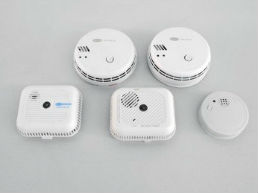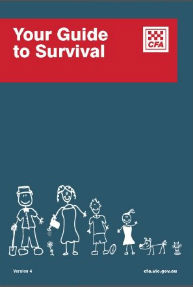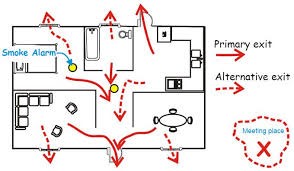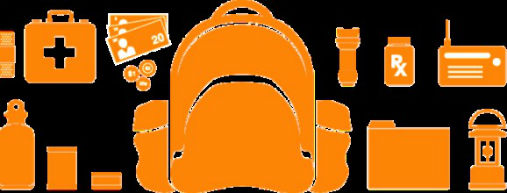In an emergency, you, your family, neighbours, friends and your business may not get immediate help from the emergency services.
It is a good idea to have a plan to take care of yourself for at least three days (72 hours).
Before an Emergency Strikes
Visit the following websites to find out whether your property could be at risk flooding or bushfire:
To prepare your home:
- Keep your home and property tidy and well maintained

- Install smoke alarms
- Maintain your emergency equipment such as a fire blanket, smoke alarm, first-aid kit and fire extinguisher
- Make sure your home and contents insurance is current and adequate by reviewing the Insurance Council of Australia checklist
- Make sure your house number can be easily seen from the street, preferably reflective both day and night, attached to a letterbox, post, wall, dedicated board or the boundary fence
- Know how and where to turn off electricity, gas and water supplies to your home
- In a high rise building, make sure you know where all exit signs, floor plans and evacuation information is placed on notice boards.
- Ask the Body Corporate Building Manager to test your Building Plan at least once a year and, if you are an owner, check with the Body Corporate Manager to ensure the building has adequate building insurance including emergency accommodation insurance.
Helping others prepare:
- If you have elderly or disabled relatives or neighbours, why not make the offer to assist them in preparing their property for emergencies?
A good way to be more prepared is to work together and stay in communication with friends, family and neighbours and keep informed of the unfolding emergency.
- Use social media sites to stay in touch with friends and family and let them know you are safe after an emergency.
- Get to know your neighbours and create a community disaster plan.
- Save important documents to the Cloud or on a USB drive and take it with you if you evacuate.
- Add In Case of Emergency to your smart phone. The number you set up is the number that will be called by emergency service personnel to let your loved ones know what happened to you if you cannot make the call.
- Have a plan for how you will access emergency accommodation.
- Stay informed of emergencies occurring near your home and across state by visiting the VicEmergency website.
- Downloading the VicEmergency app on your smart phone to receive information on emergencies near your location
An Emergency Plan will help you think about what you will do if a fire, storm or flood happens at your home, or in your area. Your Emergency Plan can be used for all emergencies.
You don’t have to live in the country to be at risk of fire, storms or floods. You could be at risk:
- If you live near areas that have significant bush, forest, long grass, or coastal scrub, then you need to plan ahead for the fire season
- If you live near a river, creek or an area that is known to flood during or after storms you may need to be more aware of possible floods
Not everyone thinks clearly in an emergency. Taking steps to get prepared means you will know what to do when you’re at risk. Things to consider include:
- Your family may be separated during the emergency. Your children may be at school and parents at work. Find out now if your children will be kept at school or sent home on their own and how you can arrange for them to be picked up. Check now if your workplace has plans in place for emergency evacuations and find out what you are meant to do
- Telephones may be working intermittently or not at all
- Power may be cut
- You may be close to danger, such as a fire or flood waters (among others), that immediately threaten your safety
- Emergency information may be limited, particularly in the early stages
- At worst, you or others may be injured or die
When making your plan, choose one or more of the guides by the CFA, FRV, VICSES or Australian Red Cross provided in the table below. These guides contain information and will ask you to think about:
- Outside your home including the roof, garden, sheds and other buildings
- Your evacuation plan
- When will you leave
- What will you take
- Who will you tell
- Where will you go
- An emergency kit including first aid equipment, water and supplies
- Your pets and other animals on your property

Make sure you share your written plan with the rest of your family and friends. Practising your plan, will help you remember what needs to be done during a crisis.
Language |
Guides for planning for an emergency |
|
| English | CFA | Your guide to survival |
| Red Cross | Preparing for Emergencies | |
| VICSES | ||
| FRV | Home Safety Booklet | |
| Emergency Management Victoria | Understanding Warnings | |
| ABC Emergency | Preparing for an emergency - Video | |
| Emergency Aware | Preparing for an emergency - Video | |
| Easy English | CFA | Before the bushfire season |
| Auslan | Deaf Emergency Information | Deaf Emergency Resources |
|
Simplified Chinese 简体中文 |
CFA | Your Guide to Survival |
| Red Cross | ||
| VICSES | Storm or Flood - Mandarin | |
| Other Languages | CFA | Your Guide to Survival |
| Red Cross | Prepare for an emergency | |
| VICSES | Get Ready |
A building escape plan helps you think about what you would do if there was a fire or flood in your home. Families who are well-prepared are more likely to escape their homes safely
As part of your plan, all family members should know:
- The two quickest ways out of every room
- How they will exit from upstairs if your home has a second storey or you live in a high rise building
- An agreed-upon meeting place outside, such as the letterbox or high rise evacuation assembly point
- How they will call Triple Zero (000) for personal safety and fire or, for storm and flood damage, VICSES (132 500)

Your emergency kit should include everything that you and your family need to cope in an emergency.
We have created a simple flyer that can help you put together your own emergency kit.
A basic home emergency kit should contain:
- Portable radio with spare batteries
- Torch with spare batteries
- First Aid kit
- A copy of your emergency plan
- Bottled water
- Enough non-perishable food for three days
- Rubber gloves
- Food and special requirements for pets
If an emergency occurs, add the following items to your emergency kit:
- Important documents such as passports, birth certificates and insurance papers
- Mobile phone and charger
- Strong boots or shoes
- Medications and prescriptions

People with disability and older people may find it hard to leave a building quickly, so planning and leaving early in times of high fire danger is important. They may need to:
- Take with them equipment such as wheelchairs, walking sticks, oxygen tanks and essential medications.
- Plan transport to leave early. If there is a large fire, taxis, Ubers and your family and friends may be put in danger trying to help you.
The Easy English version of the Red Cross Rediplan Tool has simple words and images that can help people who have difficulty reading and understanding information.
Where the Fire Danger Warning or Flood Warning is high to catastrophic, put your plan into action as early as possible.
Language |
Helping the Elderly and People with Disabilities |
|
| English | CFA | Helping people leave |
The Personal Alert Victoria (PAV) service is funded by the Victorian Government and provided free of charge to eligible frail, isolated older people and people with disabilities to help them keep living in their homes.
If you are unwell, or have fallen or need help and you press the button on the pendant, the PAV service will contact you immediately to see why you called. PAV service staff can speak with you, through the receiver unit, within a certain range, even if you cannot get to the phone.
The PAV service will:
- Help or reassure you over the phone
- Call one of your nominated contacts and ask them to check on you
- Call emergency services.
The PAV service also connects with Interpreters.
Language |
Personal Alert Victoria |
|
| English | DoH | Personal alerts |
Most emergency management information is in written or spoken English. This means that deaf, deafblind and hard of hearing Victorians who cannot rely on spoken English or whose first language is Auslan are often the last to know.
The Deaf Emergency Information resource brings important information together in one place, in Auslan and in written English. If you are deaf, deafblind or hard of hearing, the Deaf Emergency Information website will help you to:
- Understand the different natural hazards experienced by Victorians every year
- Learn from the experiences of other people in the community
- Understand how to watch and act so you can take responsibility for your own safety
- Learn how to prepare, respond and recover from natural hazard events in your area
- Understand how emergency services work together
Young children think and behave in a different way to adults especially in an emergency. For example, if there is a fire, they are more likely to hide than to leave the house.
Children are less likely than adults to wake up to the sound of a smoke alarm. Think about how you can reach children’s bedrooms if regular access is blocked by fire.
Useful tips for parents:
- Make sure children know their home address and how to call Triple Zero (000)
- Practice emergency plans with children at least twice a year - You can turn emergency plans into a game for example how quickly can you do leave the house, when walking or when crawling.
Activities, games, activities and on line games for children to learn more about emergencies can be found on the CFA and Red Cross websites.
Young children are sometimes curious about fire or reach for things that are hot which increase the risk of burns and scalds. The following Factsheets provide some tips on:
- Preventing burns and scalds
- Tips around the home
- Understanding burns and scalds
These sheets explain how to prevent burns and scalds and what to do if someone has a burn as well as some safety tips for your home:
- Basic treatment for burns
- Remove clothing around the burn, unless it has stuck to the skin
- Cool the burn under running water for 20 minutes. Never use oil, butter or ointment
- Cover the burn with a clean cloth or cling wrap and keep the patient warm
- See a doctor if the burn is blistered, larger than a 20 cent coin, or on the face, hands, feet or genitals.
Languages |
Factsheets |
| English | CFA |
|
Simplified Chinese 简体中文 |
CFA |
| Other Languages | CFA |
Emergencies can affect any business. Emergencies can lead to injury, loss of income or even the loss of life.
Improvising or adapting to circumstances at the last minute is not wise, nor safe, and often impacts how the business will recover. Small business owners feel the consequences and exposure to an emergency far more than a large enterprise and multinationals, with a lot more to lose in not being prepared.
Businesses should have an emergency plan (this should be part of any business’ continuity planning). It does not have to be overly complex but it needs to be written down, duplicated and understood by your staff and key stakeholders. Factors to consider include:
- Each business needs to review its risks focusing on those that are most likely to affect it. Risks could vary, and could range from a sudden illness of a key staff member to a robbery, flood, bushfire, electrical fire, data loss or heat stress
- Consider the effect on your staff, customers, suppliers and operations
- Check your business insurance coverage
- Keep a duplicate confidential list of emergency numbers and staff contacts
- Prepare and practice your business continuity plan for your business
- Keep an emergency kit on your premises
- Get to know your neighbouring businesses
- Make sure your street number can be easily seen from the street
Language |
Business Emergencies |
|
| English | VICSES | |
| Business Victoria | Protect Your Business | |
| Business Victoria | Cyber Security | |
| Business Australia | Cyber Security | |
| Business Australia | Emergency Management | |
| Small Business Institute | Online Emergency Planning Portal | |
| Worksafe Victoria | Safety in the Workplace |
Aside from getting your property and yourself prepared, you can also get involved by helping at local clean up days in nearby parks. Make sure you read Whitehorse News for Council updates or call for information about community days and park committees (friends groups) you can join in your local area.






